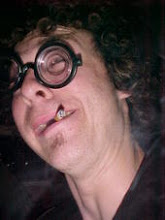
Ernest Becker's proposed mission statement in The Denial of Death is a tall order indeed. He essentially sets out to answer the question of "Why?". That is the "why" with regards to the human condition. His work, which won him a posthumous Pulitzer's prize leans heavily on work of Danish proto-existentialist Soren Kierkigaard as well as the luminary Sigmund Freud and his colleague Otto Rank.
The idea is basically that the fear of death, is the root of all of our fears and neurosis. Such is the magnitude of this fear that humans have developed specific mechanisms for rationally and emotionally coping with it's weight. These mechanisms begin developing shortly after birth and are achieved through the use of symbols. Becker claims that their is a fundamental duality of our nature. With man the physical animal (who defecates) on the one side and man the symbolic 'god' (capable of rationality and synthesis) on the other. The symbolic self allows man to embark on the "immortality project" or causa sui which gives ultimate meaning to his life. This can take form in different ways.
For elite thinkers like Freud the path to "immortality" can be achieved through ideas alone. In other words he will be preserved (symbolically speaking) long after death through the brilliance of his theories and by the influence they wield on others. For those of lesser intellect, immortality can be achieved via religion. In fact society itself, Becker claims, is constructed as a means of causa sui, providing roles that individual members can adopt thus becoming part of something larger and less transient.
This book provides a lot of fascinating insight into the human condition, delving deeply into the concepts of psychoanalysis (something I knew little about prior to reading). For instance, mental illness is characterised as the breakdown of causa sui. This dovetails neatly with the idea of society as means of causa sui.
My disagreement with Becker arises with his argument that the true reality of our existence is so awesome that to experience it in it’s actuality would reduce man to a quivering incapacitated mass of flesh. This is actually borrowed from Kierkigaard. Kierkigaard uses this realization as the jumping off point for an intimate relationship with The Creator, grounding all ones actions in the profound purpose of the divine. Becker, however is willing to do no such thing. It's telling that he makes little mention of the work of Carl Jung except in reference to Freud and Rank. He argues that our neurotic denial of death is paradoxically healthy, in fact it’s the best defense man’s capable of mustering against the brutal reality of his own condition. Lost or disregarded in all of this is the Eastern slant; that of the achievement of perfect harmony with nature, living ones life entirely in the moment.
The Denial of Death by Ernest Becker
Simon & Shuster 1973













1 comment:
In response I would offer:
The Ernest Becker Foundation newsletter on Terror Management research in the East. Plus Becker in Denial of Death p. 260
Take Norma Brown’s Life Against Death: rarely does a work of this brilliance appear. Rarely does a book so full of closely reasoned argument, of very threatening argument, achieve such popularity; but like most other foundation-shaking messages, this one is popular for all the wrong reasons. It is prized not for its shattering revelations on death and anality, but for its wholly non-sequitur conclusions: for its plea for the unrepressed life, the resurrection of the body as the seat of primary pleasure, the abolition of shame and guilt. Brown concludes that mankind can only transcend the terrible toll that the fear of death takes if it lives the body fully and does not allow any unlived life to poison existence, to sap pleasure, and to leave a residue of regret. If mankind would do this, says Brown, then the fear of death will no longer drive it to folly, waste, and destruction; men will have their apotheosis in eternity by living fully in the now of experience. The enemy of mankind is basic repression, the denial of throbbing physical life and the spectre of death. The prophetic message is for the wholly unrepressed life, which would bring into birth a new man.
And on p.267
Utopian man might live in the same ”eternal now” of the primitives, but undoubtedly too with the same real compulsivity and phobia. Unless one is talking about real immortality one is talking merely about an intensification of the character defenses and superstitions of man.
Neil Elgee
neil@ernestbecker.org
www.ernestbecker.org
Post a Comment